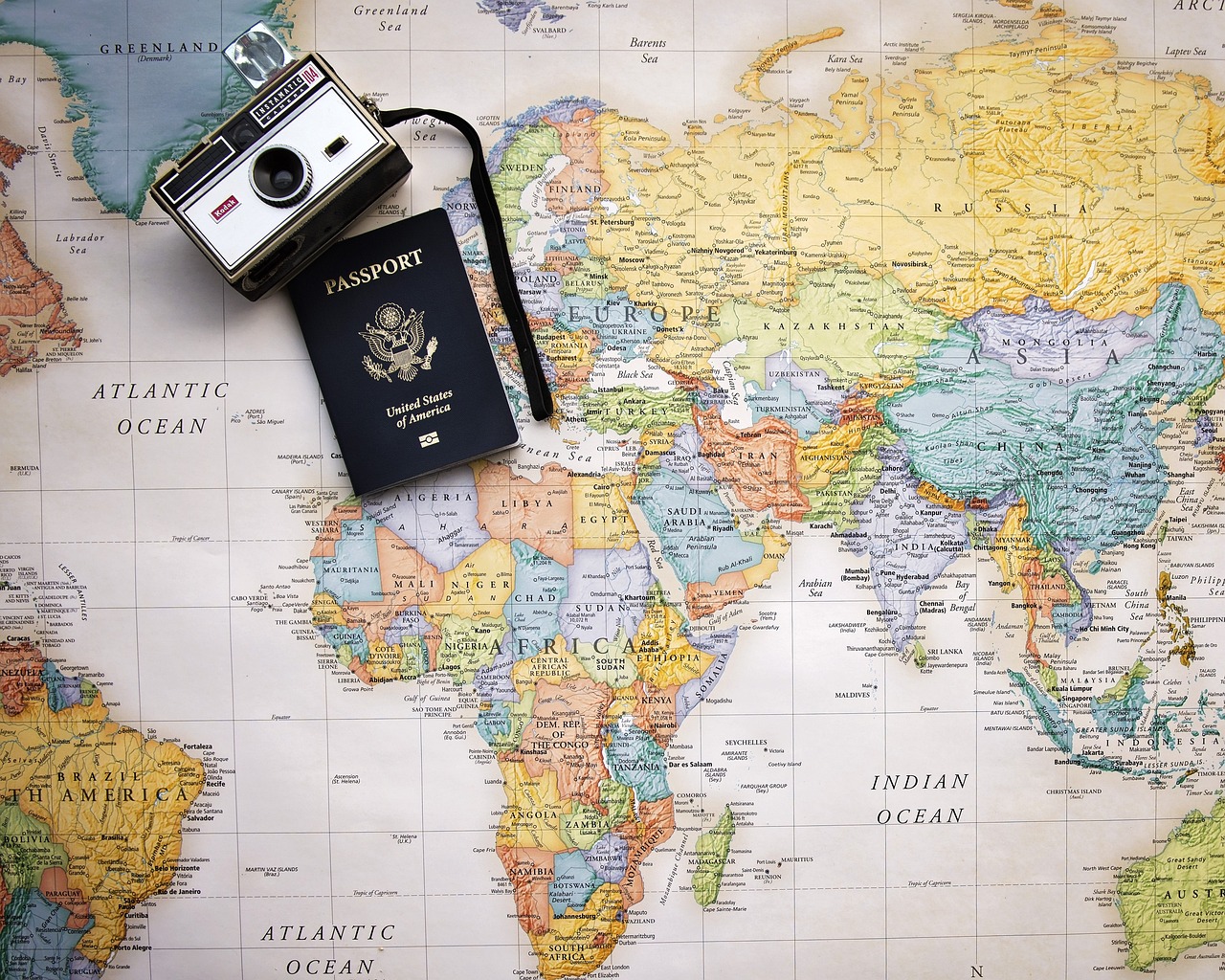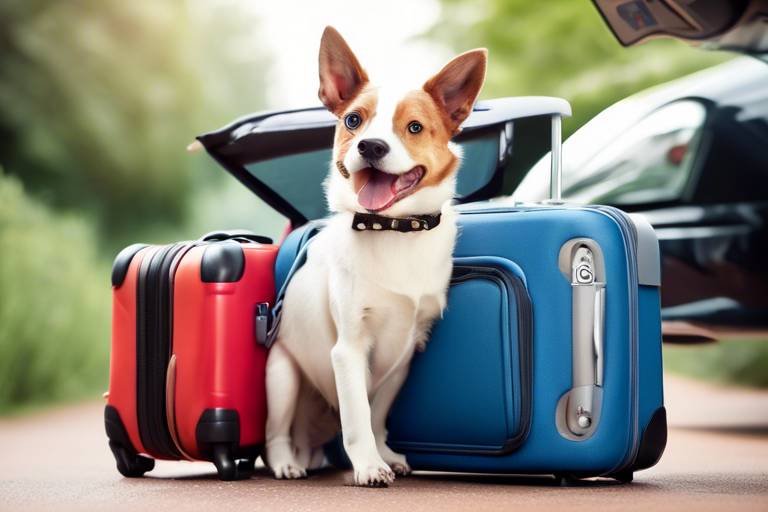The Importance of Researching Pet Laws Before Travel
Understanding pet laws is crucial for responsible pet owners. Imagine planning a trip with your furry friend, only to find out that certain regulations could put a damper on your plans. It’s like preparing for a picnic and realizing you forgot the blanket! To avoid such mishaps, it’s essential to familiarize yourself with the laws governing pet travel in your destination. This not only ensures compliance with local regulations but also contributes to a smoother journey for both you and your pet.
Traveling with pets can be an exhilarating experience, filled with adventures and memories. However, without proper research, it can also lead to unexpected challenges. Each region has its own unique set of rules regarding pet ownership and travel, which can vary significantly from one place to another. For instance, some states may require specific vaccinations for pets, while others might have restrictions on certain breeds. Understanding these regulations can prevent legal issues and ensure a safe experience. After all, no one wants to face fines or be turned away at the border!
Moreover, knowing the local pet laws can help you plan your trip more effectively. For example, if you’re heading to a city known for its pet-friendly parks, you’ll want to ensure your pet is allowed in those areas. Alternatively, some locations may have leash laws or restrictions on where pets can roam freely. By doing your homework, you can tailor your travel itinerary to include activities that both you and your pet will enjoy.
When traveling with pets, it’s also important to consider the accommodations. Not all hotels or rental properties welcome furry guests, and showing up unprepared can lead to stressful situations. Researching pet-friendly accommodations ahead of time ensures that you have a welcoming place to stay during your travels. You wouldn’t want to be left scrambling for a hotel that allows pets at the last minute, right? That’s why planning ahead is key.
In summary, the importance of researching pet laws before travel cannot be overstated. It not only protects your rights as a pet owner but also enhances the overall travel experience. Remember, a little preparation goes a long way in ensuring that your adventures with your pet are as enjoyable and stress-free as possible!
- What should I do if I find out my pet is not allowed in my destination?
Contact local authorities or pet-friendly establishments to find alternatives. - How can I find pet-friendly accommodations?
Use travel websites that specialize in pet-friendly listings or check with local hotels directly. - What are the common health requirements for traveling with pets?
Most destinations require up-to-date vaccinations and sometimes a health certificate. - Are there specific airline policies I should be aware of?
Yes, each airline has its own rules regarding pet travel, including carrier specifications and fees.

Understanding Local Pet Regulations
When it comes to traveling with your furry companions, understanding local pet regulations is absolutely vital. Imagine planning a dream vacation only to find out that your beloved pet isn’t allowed in the destination you’ve chosen. That’s a nightmare scenario for any pet owner! Each region, state, or country has its own unique set of laws governing pet ownership and travel, and being unaware of these can lead to unnecessary legal headaches or, worse, the inability to travel with your pet at all.
For instance, some places may have strict leash laws or breed restrictions that could affect your plans. It’s not just about having fun; it’s about ensuring the safety and well-being of your pet while respecting the local community. Before you pack your bags, it’s essential to dive deep into the regulations that apply to your destination. This means checking the local government websites, contacting tourism boards, or even reaching out to local pet owners through forums or social media groups.
Here are a few key aspects to keep in mind when researching local pet regulations:
- Leash Laws: Some areas require pets to be on a leash at all times, while others may allow pets to roam freely in designated areas. Knowing these rules can help you avoid fines and ensure your pet’s safety.
- Breed Restrictions: Certain breeds may be banned or restricted in specific areas. If you own a breed that falls under this category, it’s crucial to find out before you travel.
- Pet Registration: Some cities require pets to be registered with local authorities. Make sure to check if this is necessary at your destination.
- Public Spaces: Not all parks or public spaces allow pets. Understanding where your pet is welcome can enhance your travel experience.
Additionally, it’s important to consider the cultural attitudes towards pets in your destination. In some places, pets are treated like family members, while in others, they may not be as welcomed. This cultural context can significantly affect how you and your pet are perceived, so it’s wise to be aware of local norms.
In summary, understanding local pet regulations is not just a matter of legality; it's about ensuring a smooth and enjoyable trip for both you and your furry friend. By doing your homework ahead of time, you can avoid unpleasant surprises and make the most of your travels. Remember, a little research goes a long way in creating a memorable experience for both you and your pet.

Traveling with Service Animals
When it comes to traveling with service animals, understanding the rules and regulations can feel like navigating a maze. These incredible companions are not just pets; they are trained to assist individuals with disabilities, and they are granted specific rights under the law. Knowing these rights can make your travel experience smoother and more enjoyable, ensuring that both you and your service animal are treated with the respect you deserve.
First and foremost, it's essential to recognize that service animals are defined differently than emotional support animals. According to the Americans with Disabilities Act (ADA), a service animal is specifically a dog that has been individually trained to perform tasks for a person with a disability. This means that while you might have a furry friend that provides emotional support, they may not have the same access rights as a trained service dog. Understanding this distinction can help you avoid potential issues when traveling.
One of the most significant challenges when traveling with service animals is ensuring compliance with airline policies. Each airline has its own set of rules regarding service animals, and these can vary considerably. For example, some airlines may require documentation or advance notice, while others might have specific carrier requirements. It's crucial to do your homework before booking your flight. Check the airline's website or call their customer service to clarify what you'll need. This way, you can avoid any last-minute surprises that could derail your travel plans.
When it comes to flying with a service animal, airlines typically require you to fill out a service animal travel form at least 48 hours before your flight. This form often asks for details about your service animal's training and the tasks they perform. Some airlines may even require a letter from a licensed mental health professional, particularly if your service animal is an emotional support animal. To help you navigate this, here’s a quick comparison of some major airline policies:
| Airline | Advance Notice Required | Documentation Needed |
|---|---|---|
| Delta | 48 hours | Service animal form |
| American Airlines | 48 hours | Service animal form + health certificate |
| United Airlines | 48 hours | Service animal form |
Additionally, it’s important to keep your service animal well-behaved and under control throughout the journey. Airlines can deny boarding if the animal is disruptive or poses a threat to other passengers. Remember, your service animal is there to assist you, and their behavior reflects on both of you.
Lastly, don’t forget about your destination. Some states and countries have different laws regarding service animals. Before you travel, check the local regulations to ensure that your service animal will be welcome. This can save you from unexpected challenges once you arrive.
- Can I bring my emotional support animal on a plane? - Unfortunately, emotional support animals do not have the same access rights as service animals. You will need to check with the airline for their specific policies.
- What if my service animal misbehaves during the flight? - If your service animal is disruptive, the airline may ask you to remove them from the flight. It's essential to ensure your animal is trained to behave in public settings.
- Do I need to provide proof of my service animal's training? - While airlines may not require proof, having documentation can facilitate a smoother travel experience.
Airline Policies for Pets
When it comes to flying with your furry friend, understanding airline policies is crucial for a smooth journey. Each airline has its own set of rules regarding pet travel, which can vary significantly. From carrier requirements to additional fees, knowing the ins and outs can save you from unexpected surprises at the airport. Imagine arriving at the terminal only to find out your pet can't board because their carrier doesn't meet the airline's specifications—what a nightmare!
First and foremost, it's essential to check the specific pet travel policies of the airline you plan to fly with. Some airlines allow pets in the cabin, while others may require them to travel in the cargo hold. For instance, larger breeds might need to be transported as checked baggage, which raises concerns about their safety and comfort. Always look into the following key aspects:
- Carrier Dimensions: Each airline has specific size restrictions for pet carriers that fit under the seat in front of you. Make sure to measure your carrier carefully!
- Materials: The carrier should be well-ventilated and secure, made of durable materials that can withstand the rigors of travel.
- Fees: Be aware of any additional fees associated with pet travel. Some airlines charge a flat fee, while others may have tiered pricing based on the size of your pet.
To make your travel planning easier, here’s a quick comparison of some popular airlines and their pet policies:
| Airline | In-Cabin Allowed | Carrier Size (inches) | Fees |
|---|---|---|---|
| Delta | Yes | 18 x 11 x 11 | $125 each way |
| American Airlines | Yes | 19 x 13 x 9 | $125 each way |
| United Airlines | Yes | 18 x 11 x 11 | $125 each way |
| Southwest Airlines | Yes | 18.5 x 8.5 x 13.5 | $95 each way |
Before booking your flight, it’s a good idea to call the airline and confirm their latest policies, as these can change frequently. Additionally, consider booking your flight well in advance to secure a spot for your pet, as airlines often have a limited number of spaces available for pets in the cabin.
In conclusion, being informed about airline policies for pets is not just about compliance—it's about ensuring your pet’s comfort and safety during travel. After all, no one wants to face the stress of last-minute changes or, worse, leaving their beloved pet behind. So, do your homework, plan ahead, and enjoy the journey together!
Pet Carrier Specifications
When it comes to traveling with your furry companions, one of the most critical aspects to consider is the . Each airline has its own set of rules regarding the dimensions, materials, and design of carriers. This means that before you even think about packing your bags, you need to ensure that your pet's carrier complies with these guidelines. Imagine showing up at the airport only to find out that your beloved pet can't board because their carrier doesn’t meet the airline's requirements—what a nightmare!
To make your journey smoother, here are some essential specifications you should keep in mind:
- Size: Most airlines require carriers to fit under the seat in front of you. Typically, the maximum dimensions are around 18" x 11" x 11" for soft-sided carriers, but this can vary, so always check with your airline.
- Material: Carriers must be made of durable materials. Soft-sided carriers are often preferred because they can compress slightly to fit into tight spaces. However, hard carriers are also acceptable, especially for larger pets.
- Ventilation: Proper ventilation is essential for your pet's comfort. Look for carriers with mesh panels or holes that allow airflow while keeping your pet secure.
- Secure Closures: Ensure that the carrier has secure zippers or latches to prevent any escape attempts during your travels.
Furthermore, some airlines may have additional requirements, such as a specific weight limit for pets traveling in the cabin. It's crucial to weigh your pet and their carrier together to avoid any surprises at check-in. If your pet exceeds the weight limit, you might have to make alternative arrangements, such as booking them in the cargo hold, which can be stressful for both of you.
To help you visualize the differences in carrier specifications, here’s a simple table comparing the requirements from a few major airlines:
| Airline | Max Dimensions (inches) | Weight Limit (lbs) | Carrier Type |
|---|---|---|---|
| Airline A | 18 x 11 x 11 | 15 | Soft-sided |
| Airline B | 19 x 12 x 10 | 20 | Hard or Soft-sided |
| Airline C | 17 x 10 x 9 | 10 | Soft-sided |
In conclusion, taking the time to understand and adhere to pet carrier specifications not only ensures compliance with airline regulations but also enhances your pet's travel experience. A well-chosen carrier can make your journey less stressful and more enjoyable for both you and your furry friend. So, before you embark on your next adventure, double-check those carrier specs and make sure your pet is ready for takeoff!
1. What if my pet doesn't fit in the carrier?
If your pet exceeds the weight or size limits, consider alternative travel arrangements, such as flying them in the cargo hold or opting for a different airline with more flexible policies.
2. Can I use any type of carrier for my pet?
No, each airline has specific requirements regarding carrier types. Always check the airline's official website for their guidelines before purchasing a carrier.
3. How can I make my pet comfortable during travel?
Familiarize your pet with the carrier before the trip. Place their favorite blanket or toy inside to create a cozy environment, and ensure they have access to water during long trips.
4. Do I need to book my pet's spot in advance?
Yes, many airlines have a limited number of spots available for pets in the cabin, so it's wise to book well in advance to secure your pet's place.
Booking Pet-Friendly Flights
When it comes to booking flights with your furry companion, the process can feel a bit like navigating a maze. It's not just about finding the right destination; you also need to ensure that the airline you choose is pet-friendly. This means doing your homework ahead of time to avoid any last-minute surprises that could derail your travel plans. Imagine arriving at the airport, only to find out that your pet's carrier doesn't meet the airline's requirements or that the flight is fully booked for pets. Not a fun scenario, right?
To start, it's essential to research airlines that allow pets in the cabin or as checked baggage. Each airline has its own set of rules and regulations, which can vary significantly. For instance, some airlines might only allow pets under a certain weight limit in the cabin, while others may have specific restrictions on the types of carriers allowed. To help you understand the landscape, here’s a quick comparison of some popular airlines and their pet policies:
| Airline | Pet in Cabin | Weight Limit | Carrier Dimensions (LxWxH) | Fees |
|---|---|---|---|---|
| Airline A | Yes | 15 lbs | 18"x11"x11" | $100 |
| Airline B | Yes | 20 lbs | 19"x12"x12" | $125 |
| Airline C | No | N/A | N/A | N/A |
As you can see, knowing the specific pet policies of different airlines can save you a world of trouble. Once you've narrowed down your options, make sure to book your flight early. Many airlines have a limited number of spots available for pets in the cabin, so the earlier you can secure your reservation, the better your chances of getting a spot for your furry friend.
Don't forget to check for any additional fees that may apply. Some airlines charge for pet travel, while others may include it in the ticket price. It's always a good idea to clarify these details at the time of booking to avoid any unexpected charges at the airport.
Lastly, if your pet has special needs or requires additional accommodations, don’t hesitate to reach out to the airline directly. Customer service representatives are usually more than willing to assist you and can provide valuable information to ensure a smooth journey for both you and your pet.
In summary, booking pet-friendly flights involves a bit of research and planning, but the reward of traveling with your beloved pet is worth the effort. So, take the time to investigate your options, understand the rules, and book early to make your travel experience as enjoyable as possible!
- What should I do if my pet is too large to travel in the cabin? If your pet exceeds the weight limit for cabin travel, you may need to book them as checked baggage or cargo. Be sure to check the airline's policies on traveling with larger pets.
- Can I bring my pet on international flights? Yes, but you'll need to research the specific regulations of the destination country regarding pet travel, including health certificates and vaccination requirements.
- What if my pet has anxiety during flights? Consult with your veterinarian about potential solutions, such as calming medications or anxiety wraps, to help your pet feel more comfortable during the journey.
Accommodation Considerations
When you're hitting the road with your furry friend, finding the right place to stay is just as important as planning your route. Not all accommodations are created equal, and many hotels and rentals have specific policies regarding pets. Imagine arriving at your destination after a long drive or flight, only to find out that your hotel doesn't allow pets. What a bummer! To avoid this headache, it’s crucial to do your homework ahead of time and ensure that your chosen lodging is pet-friendly.
First off, start by researching accommodations that explicitly welcome pets. Websites like BringFido or PetsWelcome can be invaluable resources. They not only list pet-friendly hotels but also provide reviews from other pet owners, giving you insights into their experiences. Look for places that offer amenities for pets, such as dog parks, pet beds, or even treats at check-in. These little touches can make your stay much more enjoyable for both you and your pet.
Another key factor to consider is the size and breed restrictions. Some places might have limitations on the weight of pets or specific breeds they allow. If you have a large dog, it’s essential to confirm that your accommodation can accommodate them. Additionally, check if there are any extra fees associated with bringing your pet along. Some hotels charge a non-refundable cleaning fee or a nightly pet fee, which can add up quickly.
It’s also wise to familiarize yourself with the surrounding area. Are there parks nearby where you can take your pet for a walk? Is the neighborhood safe and pet-friendly? Knowing what to expect can significantly enhance your travel experience. You wouldn’t want to find yourself in a location with no green spaces for your pet to stretch their legs!
Lastly, don’t forget to read the fine print in the accommodation's pet policy. Some places have strict rules about leaving pets unattended in rooms, while others may require pets to be on a leash in common areas. Understanding these guidelines can help you avoid any potential conflicts during your stay.
In summary, taking the time to research and select pet-friendly accommodations can make all the difference in your travel experience. By ensuring your lodging is welcoming to your furry companion, you can focus on what really matters: enjoying your adventure together!
- What should I look for in pet-friendly accommodations? Look for places that welcome pets, have amenities for them, and check for size and breed restrictions.
- Are there additional fees for bringing my pet? Many pet-friendly accommodations charge extra fees, so be sure to check the policy beforehand.
- Can I leave my pet alone in the room? Some hotels have strict rules about leaving pets unattended, so always check the pet policy.
- Are there pet-friendly activities near my accommodation? Research local parks or pet-friendly attractions to ensure you have plenty of options for your pet to enjoy.

Health and Safety Regulations
When it comes to traveling with your beloved pets, are paramount. Ensuring that your furry friend is healthy and up-to-date on vaccinations is not just a good practice; it’s often a legal requirement. Imagine planning a dream vacation only to be turned away at the border because your pet hasn’t had the necessary shots! That scenario can be avoided with a little bit of research and preparation.
Different destinations may have specific vaccination requirements for pets, particularly if you are traveling internationally. For instance, some countries require pets to be vaccinated against rabies at least 21 days before travel. This is where a simple checklist can come in handy:
- Check the vaccination requirements for your destination.
- Ensure your pet is vaccinated well in advance.
- Keep a record of vaccination dates and types.
Moreover, many states and countries require a health certificate for pets traveling across borders. This document, usually issued by a veterinarian, confirms that your pet is healthy and free from contagious diseases. It’s like a passport for your pet! Obtaining a health certificate can be a straightforward process, but it requires planning. You’ll need to schedule a vet visit, and it’s best to do this within a specific time frame before your trip—typically within 10 days. This ensures that the certificate is valid during your travels.
Here’s a quick rundown of what you should keep in mind when considering health certificates:
| Step | Description |
|---|---|
| 1 | Schedule a vet appointment to assess your pet’s health. |
| 2 | Ask your vet about the specific health certificate requirements for your destination. |
| 3 | Obtain the health certificate, ensuring it is filled out correctly. |
| 4 | Keep copies of the certificate with you during your travels. |
Taking these steps not only ensures compliance with regulations but also gives you peace of mind. After all, the last thing you want is to be stressed out about your pet's health while you're trying to enjoy a vacation. Remember, a little preparation goes a long way!
In conclusion, understanding the health and safety regulations for traveling with pets is essential for a smooth journey. By being aware of vaccination requirements and obtaining the necessary health certificates, you can help ensure that your pet travels safely and legally. So, before you pack your bags, make sure you’ve done your homework to keep your furry friend happy and healthy on the road!
Q: What vaccinations do my pets need before traveling?
A: The required vaccinations can vary by destination, but rabies is commonly required. Always check the specific regulations for your travel location.
Q: How do I obtain a health certificate for my pet?
A: Schedule a visit with your veterinarian. They will assess your pet's health and provide the necessary documentation if your pet is fit for travel.
Q: How far in advance should I get my pet vaccinated?
A: It’s best to vaccinate your pet at least 21 days before international travel, but check with your vet for specific recommendations.
Vaccination Requirements
When planning a trip with your furry companion, one of the most critical aspects to consider is the of your destination. Different regions and countries have varying regulations regarding which vaccinations pets must have before entry. Ignoring these requirements can lead to serious consequences, including quarantine or even denial of entry. So, what should you keep in mind?
First and foremost, it’s essential to check the specific vaccination requirements for your pet based on where you're traveling. For instance, many places require pets to be vaccinated against rabies, which is a serious viral disease that affects mammals, including humans. This vaccination is often mandated for pets older than three months. Additionally, some destinations may have other specific vaccine requirements, such as those for distemper, parvovirus, or leptospirosis.
To make things easier, here’s a quick breakdown of common vaccination requirements:
| Destination | Required Vaccinations | Notes |
|---|---|---|
| United States | Rabies | Must be administered at least 30 days before travel. |
| European Union | Rabies, Distemper | Health certificate required; rabies vaccine must be 21 days old. |
| Australia | Rabies, Parvovirus | Strict quarantine laws; vaccinations must be documented. |
Before you hit the road or board that plane, ensure your pet's vaccinations are up-to-date. It's advisable to visit your veterinarian well in advance of your trip. They can provide you with the necessary vaccinations and issue a health certificate, which is often required by airlines and border control. This certificate acts as proof that your pet is healthy and up-to-date on vaccinations, making your travel experience smoother and less stressful.
Moreover, some countries have specific timelines for when vaccinations must be administered. For example, in certain regions, the rabies vaccination must be given at least 30 days prior to travel. This means that if you’re planning a spontaneous getaway, you might find yourself in a bit of a pickle if your pet isn’t current on their shots. So, planning ahead is not just a good idea; it’s essential!
In conclusion, being proactive about your pet's vaccination requirements can save you from a world of hassle and ensure that your travel experience is enjoyable and stress-free. Remember, a little preparation goes a long way in making your journey with your pet a memorable one!
- What vaccinations are typically required for international travel? Most countries require proof of rabies vaccination, but others may require additional vaccines.
- How far in advance should I get my pet vaccinated? It's best to consult your veterinarian at least 4-6 weeks before your trip to ensure all vaccinations are up-to-date.
- Do I need a health certificate for my pet? Yes, many airlines and destinations require a health certificate issued by a veterinarian.
Health Certificates for Travel
When it comes to traveling with your furry companions, one of the most crucial documents you need is a health certificate. This document serves as proof that your pet is healthy and fit for travel. It's not just a formality; many states and countries require it to ensure that pets are free from contagious diseases. Imagine planning a dream vacation only to be turned away at the border because you forgot this essential piece of paperwork! To avoid such a scenario, it’s vital to understand what a health certificate entails and how to obtain one.
A health certificate is typically issued by a licensed veterinarian and must confirm that your pet has been examined and is free from any signs of illness. The certificate usually includes important information such as:
- Your pet's identification details (name, breed, age, etc.)
- Vaccination records, particularly for rabies and other required vaccinations
- A statement of health from the veterinarian
- The date of the examination
Different states and countries have varying requirements when it comes to health certificates. For example, some places may require that the certificate be issued within a specific timeframe before travel—often within 10 days. This means that if you're planning a trip, you should schedule a vet visit well in advance to ensure you have all the necessary paperwork in order. Additionally, if you're traveling internationally, you may need to comply with even stricter regulations, which could involve additional vaccinations or treatments.
Obtaining a health certificate is generally a straightforward process, but it does require some preparation. Here’s a simple roadmap to help you navigate through it:
- Schedule a Vet Appointment: Make sure your pet is up-to-date on vaccinations and schedule a health check-up.
- Gather Documentation: Bring any previous vaccination records and details about your travel plans to the vet.
- Receive the Health Certificate: After the examination, your vet will provide you with the necessary health certificate.
- Check Destination Requirements: Before you leave, double-check the specific health certificate requirements for your destination.
In summary, a health certificate is not just a piece of paper; it's a vital part of ensuring your pet's safety and compliance with travel regulations. By taking the time to secure this document, you can enjoy peace of mind knowing that your furry friend is ready for an adventure. So, before you pack your bags and hit the road, make sure you have that health certificate in hand!
1. How long is a health certificate valid?
Most health certificates are valid for 10 days, but this can vary based on your destination's regulations. Always check the specific requirements for your travel location.
2. Can I get a health certificate online?
No, health certificates must be issued by a licensed veterinarian after a physical examination of your pet.
3. What if my pet has a pre-existing condition?
If your pet has a pre-existing condition, discuss it with your vet. They can advise you on how it may affect the issuance of a health certificate.
4. Do I need a health certificate for domestic travel?
While not all states require a health certificate for domestic travel, having one can help avoid complications, especially if you're crossing state lines.
5. What happens if I don’t have a health certificate?
Without a health certificate, you may face quarantine or denial of entry at your destination, which can ruin your travel plans.
Frequently Asked Questions
- What should I know about local pet laws before traveling?
It's essential to research the specific pet laws of the area you plan to visit. Each region may have different regulations regarding pet ownership, leash laws, and even breed restrictions. Familiarizing yourself with these laws can help you avoid fines or legal issues during your trip.
- Are service animals treated differently than regular pets when traveling?
Yes, service animals have specific legal protections under the Americans with Disabilities Act (ADA). This means they are allowed in places where pets may not be, such as restaurants and hotels. However, it's important to know the local laws regarding service animals to ensure your rights and your companion's rights are respected.
- How do I find pet-friendly airlines?
Start by checking airline websites for their pet travel policies. Look for those that explicitly state they accommodate pets and read reviews from other pet owners. Booking in advance can also help you secure a spot on a pet-friendly flight.
- What are the requirements for pet carriers on airlines?
Each airline has specific dimensions and material requirements for pet carriers. Generally, carriers should be well-ventilated, secure, and comfortable for your pet. Always check the airline’s website for the exact specifications to ensure your carrier meets their guidelines.
- Do I need a health certificate for my pet when traveling?
Yes, many destinations require a health certificate for pets traveling across state lines or internationally. This certificate, typically issued by a veterinarian, confirms that your pet is healthy and up to date on vaccinations. It's advisable to obtain this certificate shortly before your trip to ensure it remains valid.
- What vaccination requirements should I be aware of?
Different regions may have specific vaccination requirements for pets. Common vaccinations include rabies and distemper. Make sure your pet is up-to-date on all necessary vaccinations to prevent quarantine or denial of entry at your destination.
- How can I find pet-friendly accommodations?
Use travel websites that allow you to filter search results for pet-friendly options. Reading reviews can also help identify places that are genuinely welcoming to pets. It's a good idea to call ahead and confirm their pet policy to avoid any surprises upon arrival.



















